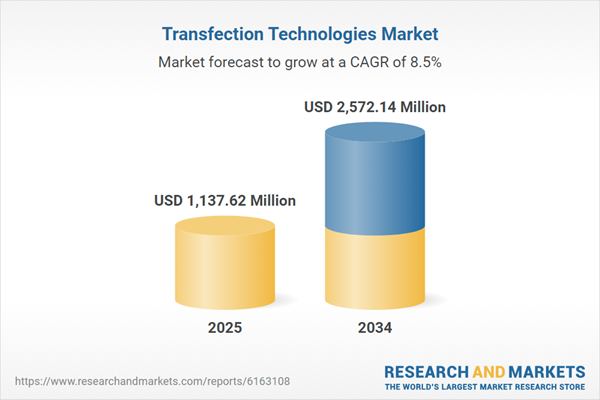Transfection Technologies: Introduction
Transfection technologies are the techniques and methods that are used to introduce foreign genetic material into cells such as DNA and RNA. These technologies are widely used in gene therapies, drug discovery, and biotechnology. There are several merits and demerits of each transfection method available. Transfection can be achieved through viral or non-viral delivery systems. The most commonly used techniques are chemical transfection, electroporation, and viral-mediated transfection.Transfection technologies are advancing in our understanding of genetics, facilitating drug discovery, and contributing to the development of innovative therapies. The continuous evolution and optimization of transfection methods contribute to the ongoing breakthroughs in molecular biology and can potentially participate in future advancements in fields such as gene therapy, regenerative medicine, and precision medicine .
Global Transfection Technologies Market Analysis
There are several key trends in the market including the development of non-viral delivery systems which are gaining popularity due to their improved safety profiles and ease of use compared to viral vectors. Additionally, gene editing technologies, cell-specific transfection, high throughput transfection, application specific transfection are also key trend contributing to the global transfection technologies market expansion.Enhancing cell survival, decreasing, cytotoxicity, and, improving transfection efficiency are the main goals of ongoing research and development. The development of transfection methods that allow for the simultaneous transfection of numerous wells or cell arrays is a result of the necessity for high-throughput screening and analysis in drug discovery and functional genomics. Transfection procedures can be improved and standardized due to the growing integration of transfection technologies with laboratory automation systems, which is likely to aid the transfection technologies market growth. Automated transfection platforms allow accurate and reliable transfection across numerous samples, boosting throughput and reproducibility and accelerating market growth.
Global Transfection Technologies Market Segmentations
The report titled “Transfection Technologies Market Report and Forecast 2025-2034 offers a detailed analysis of the market based on the following segments:Market Breakup by Method
- Reagent-based Method
- Instrument-based Method
- Other Methods
Market Breakup by Application
- Biomedical Research
- Therapeutic Delivery
- Protein Production
Market Breakup by Products
- Reagent
- Instrument
- Others
Market Breakup by End User
- Pharmaceutical and Biotechnology Companies
- Contract Research Organizations
- Academic and Research Institutes
Market Breakup by Region
- North America
- Europe
- Asia Pacific
- Latin America
- Middle East and Africa
Global Transfection Technologies Market Overview
The market for transfection technologies has witnessed significant growth in recent years, and is expected to grow in coming years as well. The growth of the market is driven by the increasing demand for genetic research, drug discovery, and gene therapy applications. The market offers a range of transfection methods, including viral and non-viral delivery systems.The transfection technologies market development is driven by the increasing focus on genetic research which includes functional genomics, proteomics, and personalized medicine. The increasing emphasis on genetic research, including genomics, proteomics, and personalized medicine is driving the demand for transfection technologies propelling the market growth. Recombinant proteins, monoclonal antibodies, and gene treatments are among the biopharmaceuticals that are in high demand. By facilitating the entry of recombinant DNA constructs into host cells for protein expression, transfection technologies play a crucial role in the manufacture of these complex biologics.
Transfection Technologies Market: Competitor Landscape
The key features of the market report include patent analysis, grants analysis, clinical trials analysis, funding and investment analysis, partnerships, and collaborations analysis by the leading key players. The major companies in the market are as follows:- Lonza Group
- Bio-Rad Laboratories, Inc.
- Thermo Fisher Scientific
- Qiagen NV
- Promega Corporation
- SignaGen Laboratories
- Merck KGaA
- Altogen Biosystems
- Polyplus-transfection SA
- Mirus Bio
This product will be delivered within 3-5 business days.
Table of Contents
Companies Mentioned
- Lonza Group
- Bio-Rad Laboratories, Inc.
- Thermo Fisher Scientific
- Qiagen NV
- Promega Corporation
- SignaGen Laboratories
- Merck KGaA
- Altogen Biosystems
- Polyplus-transfection SA
- Mirus Bio
Table Information
| Report Attribute | Details |
|---|---|
| No. of Pages | 350 |
| Published | July 2025 |
| Forecast Period | 2025 - 2034 |
| Estimated Market Value ( USD | $ 1137.62 Million |
| Forecasted Market Value ( USD | $ 2572.14 Million |
| Compound Annual Growth Rate | 8.5% |
| Regions Covered | Global |
| No. of Companies Mentioned | 10 |









